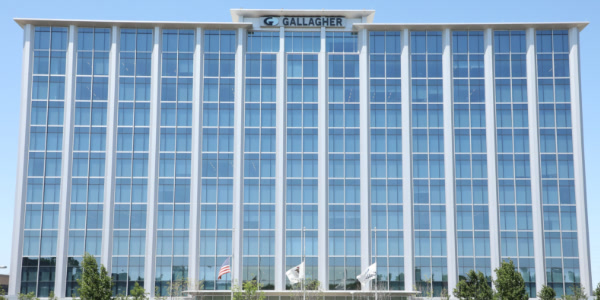

Insurance may have a stodgy reputation, but the returns from A.J. Gallagher are anything but. Its CEO says the insurance broker isn't slowing down either, despite concerns about premiums and interest rate cuts.
On Thursday, A.J. Gallagher reported second-quarter earnings of $2.26 a share, two cents ahead of the consensus estimate, while revenue of $2.73 billion was in line with what analysts predicted.
Organic revenue grew 7.7% in the quarter, a period that saw a dozen new acquisitions with a combined $72 million of estimated annualized revenue. That's a key consideration given how M&A propels profit for insurance brokers. A.J. Gallagher said it has a pipeline of more than $500 million of annualized revenue in potential purchases.
Chief Executive Patrick Gallagher spoke with Barron's Thursday about the results, calling the quarter a "smash hit." He also says the report shouldn't come as much of a surprise, given the company's consistency. "It's a natural continuation of our incredible number of quarters, years, decades — if you will — of success."
That success has been shared with investors, given A.J. Gallagher's total shareholder return of 500% over the past decade, he notes. That should provide some comfort to investors worried about a decline in insurance premiums or interest rates.
As a broker, A.J. Gallagher doesn't assume any risk or pay out claims like a traditional insurer. The company gets its revenue from the fees paid as a percentage of premiums. Those have been rising with inflation, but some have feared they will slow down as inflation cools. Likewise, a cut to interest rates would lower profitability, given some of the company's portfolio of highly liquid premiums and claims is invested in U.S. Treasuries.
However, Gallagher says it's disingenuous to talk about insurance premiums as a monolith, as rates for one kind of coverage often fall as those for another rise. In addition, while higher interest rates do make a difference because the firm holds fiduciary funds, the CEO says he isn't overly concerned with potential rate cuts, saying "we grew the company quite well for years on zero [and near zero] interest rates."
Likewise, the company's acquisition strategy means that its pool of funds will continue to grow, yielding higher interest even in the face of lower rates. "I predict we'll make up for volume we lose by virtue of lower interest rates," Gallagher says.
Those factors ultimately lend themselves to smooth and steady growth. He points to how well A.J. Gallagher has performed over time, even when disruptions like the 2008-09 financial crisis and COVID-19 pandemic occur. Its business will only increase as the world gets riskier, as evidenced by last week's CrowdStrike outage that highlighted the need for nearly all businesses to carry tech policies — ones that may be beyond the capability of smaller shops who are then more likely to accept acquisition offers from Gallagher.
One year ago, Barron's recommended shares of A.J. Gallagher, citing its long history of market-beating performance and ongoing success in buying up smaller brokers. The shares have gained some 26% since, compared with around 20% for the S&P 500 over the same period.
Gallagher says that's likely to continue, given insurance is the "oxygen of commerce...nothing happens without insurance, you can't build a building or ship a container without it."
The company's 'all-weather model' makes it particularly attractive during uncertain times, like the recent market slump. Gallagher cites a Fortune 500 executive who recently remarked to him: "I'm beginning to realize that when things are bad they're good for you."
And what about when times are good? Gallagher asked the exec. " I know, they're good for you too," he replied.
Reprinted from Barron's with permission.
